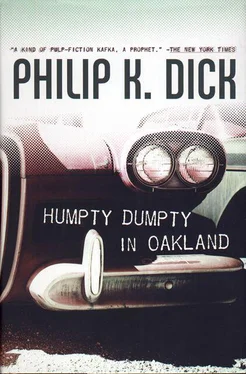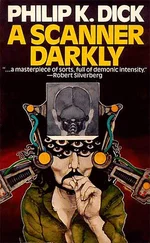It’ll be science throughout, he told himself. Atomic, like in the labs. Like Livermore where they invented the Bomb.
He saw himself a part of the new world, along with Harman, along with all other enterprising men. This is America, he thought. Vision. What you do with capital and imagination. And I have both.
Boldness, he thought. You have to be bold. Even ruthless. Or otherwise they’ll get you. They’re always in wait, trying to pull you down to their level; naturally when you get up there they resent it. They envy. You ignore that, however. Like Nixon does; he stands and sneers when they insult him, throw rocks, even spit. Risks his life.
His eyes half-shut, submerged in the hot water, with new water roaring, the old man thought of himself that way, not lost in the dirty, unimportant San Pablo Avenue of drive-ins; he saw himself with the big people who mattered. I’m in industry, he thought. Not politics; that’s not my game. This country is founded on business. It’s the backbone.
Investment! I’m investing, in the future of America. Not for my own good—hell, not for profit—but to expand the economy. And it will count. What I do will count.
The early-morning street was damp, and over all the houses was a fog, wet enough to start drops slipping across the upright surfaces. Nobody was out, but occasional yellow rectangles were kitchens in which, Jim Fergesson imagined, men stood before open ovens with their rumps to the heat.
He shaved, and fried some mush left over from the day before, drank gritty dark coffee that had been standing in the pot, and then with his overcoat around him he descended the stairs to the basement garage in which his Pontiac was parked. Lydia was asleep. No one heard him; no one saw him go.
Moisture had gotten into the engine and it died twice as he backed the car from the garage. Its hollow coughing continued as he drove down Grove Street, and he could not help thinking that had he the time he would take the car entirely apart. Almost everything in it was worn; nothing engaged. He did not shift into high gear but remained in second until he reached a stop light; there he looked carefully and without stopping turned right. Soon he was driving at thirty-five miles an hour through Oakland. By the time he had gone a mile the engine had warmed and was working a little better. He put on the radio and listened to a program of the Sons of the Pioneers.
Most of the drivers along Eastshore Freeway had in mind the idea of going to San Francisco. Traffic was heavy facing him but his own lanes were open as he continued toward Richmond. The windows of the Pontiac were up and the heater was on. He felt comfortable and sleepy, and the cowboy music lulled him. Gradually he let the car slide from its lane, and then, as a car behind him honked, he drew himself up on the seat and concentrated. The time was six-thirty.
Along the flat shoreline of the East Bay, on his right, ran the Aquatic Park. He had by this time reached a speed of sixty miles an hour, and that seemed to him plenty. Apparently he had not been this way in more time than he realized; there were changes in the freeway, new overhead ramps being built, detours and cut-offs which confused him. And already, he noticed, the freeway was twelve lanes wide. Did they have to make it even wider? The pavement was white cement and there were no stops. The flatness of the pavement pleased him. He held the wheel with both hands and gazed at the houses and hills to his right.
Now the problem came of finding Hoffman Boulevard; he had to get over to the right or he would not be able to leave the freeway. So he drifted gradually, thinking that this was the best way. Cars on his right, however, did not think so; a chorus of horns jolted him. Gunning the car forward, he shot into an open space in the right-hand lane, almost the asphalt shoulder. A moment later his car coasted along the narrow, bumpy temporary start of Hoffman; he shot past a green light at an intersection and under an ominous black-iron overpass with huge warning signs and winking yellow lights; the lights alternated in a pattern that made him feel, as he drove beneath them, that something terrible was going to happen. The passage under the overpass was so narrow that for a moment he thought the car would not make it. He had the illusion that he would scrape on both sides, and it was all he could do to keep his hands on the steering wheel. But already he had come out on the far side; there, once more, was the Bay to his left.
Several miles later Hoffman entered a strip of cut-rate gasoline stations and truck drivers’ cafes, and then the worst section of run-down Negro shacks that he could recall. Traffic moved very slowly, with huge diesel trucks interspersed among the cars. This, he understood, was Richmond. Trash littered the broken sidewalks.
To his left he saw factories and wharves. Near the water, he realized. Train tracks, one after another. And then, ahead, a steep hill with houses. The street turned sharply. He saw an open place, and then the immense Standard Oil refinery. All at once the street became a freeway again, climbing, with the cars picking up speed on all sides of him. He whizzed along a broad curve, above the refinery, and now he saw the Bay once more, and the bridge that connected the East Bay to Marin County. It was the ugliest bridge he had ever seen, but it did not depress him; instead, it made him laugh.
He slowed at the toll plaza of the bridge, paid his seventy-five cents, and then found himself on the bridge. They had built it so that the driver could see nothing, no water, none of the islands, not even his destination; all he could pick out were the heavy metal rails.
What genius, he said to himself. What planning. Again he laughed.
At last one sight became obvious; he fastened his gaze on it, far ahead. San Quentin Prison, clay-colored buildings like some old Mexican fort, spread out at the water’s edge, all in very good shape. The bridge passed to the right of the prison and let him off on a wide freeway which led into one cut-off after another. Again he was confused. But a sign told him which cut-off to take to get onto US 101 North. And so he took that.
He sped across a flat plain at enormous speed, a car behind him and another ahead. Wind whipped at his Pontiac. There was San Rafael and US 101; he had almost arrived, and it had not taken very long. He was well ahead of schedule, and his spirits rose even further.
When he saw a gas station on a little side cut-off road he made a signal and coasted from the freeway. After several turns he found himself at the gas station. Leaving the road he brought the car to the nearest island of pumps. The morning air, as he opened the car door, was warm. Wind riffled the stalks of weeds growing in the surrounding fields.
He lifted the hood and with a page of newspaper took an oil reading. The oil level was down, so he picked up a quart of 30 weight from the rack by the pumps. The boyish attendant in his white uniform was hurrying over as the old man emptied the oil into the pouring-can that had been put nearby.
“Hey,” the boy said indignantly. “None of that.”
“Sorry,” Fergesson said, remembering, now, that he was not in his own garage. “Give me five of the regular.” He had already begun to reach for the gas hose, but he pretended that he had been reading the price. Ethyl was thirty-nine cents a gallon. He showed amazement at the amount as the boy lifted down the hose.
The boy was still upset. As he walked to the rear of the car and removed the gas cap, he watched the old man as if expecting him to tinker again with the company’s property. Self-consciously, the old man got back inside the car and remained there until the boy came around to wash the windshield. “No, no,” he said to the boy, wanting to leave, pushing several one-dollar bills at him.
Читать дальше










